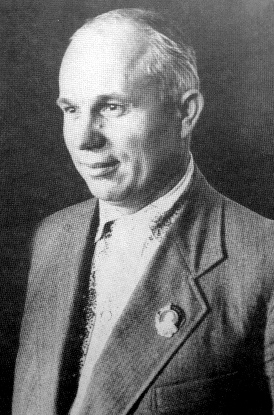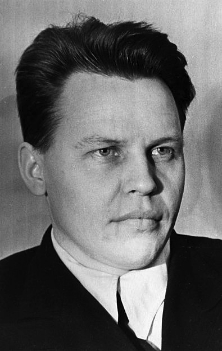|
Beria
Lavrentiy Pavlovich Beria ka, ლავრენტი პავლეს ძე ბერია} ''Lavrenti Pavles dze Beria'' ( – 23 December 1953) was a Soviet politician and one of the longest-serving and most influential of Joseph Stalin's secret police chiefs, serving as head of the People's Commissariat for Internal Affairs (NKVD) from 1938 to 1946, during the country's involvement in the Second World War. An ethnic Georgian, Beria enlisted in the Cheka in 1920, and quickly rose through its ranks. He transferred to Communist Party work in the Caucasus in the 1930s, and in 1938 was appointed head of the NKVD by Stalin. His ascent marked the end of the Stalinist Great Purge carried out by Nikolai Yezhov, whom Beria purged. After the Soviet invasion of Poland in 1939, Beria organized the Katyn massacre of 22,000 Polish officers and intelligentsia, and after the occupation of the Baltic states and parts of Romania in 1940, he oversaw the deportations of hundreds ... [...More Info...] [...Related Items...] OR: [Wikipedia] [Google] [Baidu] |
Sergei Kruglov (politician)
Sergei Nikiforovich Kruglov (2 October 1907 – 6 July 1977) was the Minister of Internal Affairs of the Soviet Union from January 1946 to March 1953 and again from June 1953 until February 1956. He held the military rank of Colonel General. He was involved in several brutal actions of the Soviet security forces. These actions occurred in the 1940s and were carried out alongside his comrade-in-arms General Ivan Serov. Kruglov was fluent in several foreign languages, including English, and was awarded the Legion of Merit and created an Honorary Knight Commander of the Order of the British Empire for organizing the security of the Yalta Conference and the Potsdam Conference during World War II.''Who Controls the Police?'' |
Nikolai Yezhov
Nikolai Ivanovich Yezhov ( rus, Николай Иванович Ежов, p=nʲɪkɐˈlaj ɪˈvanəvʲɪtɕ (j)ɪˈʐof; 1 May 1895 – 4 February 1940), also spelt Ezhov, was a Soviet Chekism, secret police official under Joseph Stalin who was head of the NKVD from 1936 to 1938, at the height of the Great Purge. Yezhov organized mass arrests, torture, and executions during the Great Purge, but he fell out of favour with Stalin and was arrested, subsequently admitting in a confession to a range of Anti-Sovietism, anti-Soviet activity including "unfounded arrests" during the Purge. He was executed in 1940 along with others who were blamed for the Purge. Early life and career Yezhov was born either in Saint Petersburg, according to his official Soviet biography, or in southwest Lithuania (probably Veiveriai, Marijampolė or Kaunas). Although Yezhov claimed to be born in Saint Petersburg, hoping to "portray (himself) in the guise of a deeply-rooted proletarian", he confessed ... [...More Info...] [...Related Items...] OR: [Wikipedia] [Google] [Baidu] |
Candide Charkviani
Kandid Charkviani ( ka, კანდიდ ჩარკვიანი, ; 1907 – 13 September 1994 ბიოგრაფიული ლექსიკონი, საქართველოს პარლამენტის ეროვნული ბიბლიოთეკა.) was a Georgian party and government official, and First Secretary of the Communist Party of |
Georgy Malenkov
Georgy Maximilianovich Malenkov (8 January 1902 O.S. 26 December 1901">Old_Style_and_New_Style_dates.html" ;"title="/nowiki>Old Style and New Style dates">O.S. 26 December 1901ref name=":6"> – 14 January 1988) was a Soviet politician who briefly led the Soviet Union after Joseph Stalin's death in 1953. After one week, Malenkov was forced to give up control of the party apparatus, but continued to serve as Premier of the Soviet Union. He then entered a power struggle with the party's First Secretary Nikita Khrushchev which culminated in Malenkov's removal from the premiership in 1955 as well as the Presidium in 1957. Malenkov served in the Red Army during the Russian Civil War and joined the Communist Party in 1920. From 1925, he served in the staff of the party's Organizational Bureau ( Orgburo), where he was entrusted with overseeing member records; this role led to his heavy involvement in facilitating Stalin's purges of the party in the 1930s. From 1939, Malenkov was a m ... [...More Info...] [...Related Items...] OR: [Wikipedia] [Google] [Baidu] |
NKVD
The People's Commissariat for Internal Affairs (, ), abbreviated as NKVD (; ), was the interior ministry and secret police of the Soviet Union from 1934 to 1946. The agency was formed to succeed the Joint State Political Directorate (OGPU) secret police organization, and thus had a monopoly on intelligence and state security functions. The NKVD is known for carrying out political repression and the Great Purge under Joseph Stalin, as well as counterintelligence and other operations on the Eastern Front of World War II. The head of the NKVD was Genrikh Yagoda from 1934 to 1936, Nikolai Yezhov from 1936 to 1938, Lavrentiy Beria from 1938 to 1946, and Sergei Kruglov in 1946. First established in 1917 as the NKVD of the Russian SFSR, the ministry was tasked with regular police work and overseeing the country's prisons and labor camps. It was disbanded in 1930, and its functions dispersed among other agencies before being reinstated as a commissariat of the Soviet Union ... [...More Info...] [...Related Items...] OR: [Wikipedia] [Google] [Baidu] |
Joseph Stalin
Joseph Vissarionovich Stalin (born Dzhugashvili; 5 March 1953) was a Soviet politician and revolutionary who led the Soviet Union from 1924 until Death and state funeral of Joseph Stalin, his death in 1953. He held power as General Secretary of the Communist Party of the Soviet Union, General Secretary of the Communist Party from 1922 to 1952 and as the fourth Premier of the Soviet Union, premier from 1941 until his death. He initially governed as part of a Collective leadership in the Soviet Union, collective leadership, but Joseph Stalin's rise to power, consolidated power to become an absolute dictator by the 1930s. Stalin codified the party's official interpretation of Marxism as Marxism–Leninism, while the totalitarian political system he created is known as Stalinism. Born into a poor Georgian family in Gori, Georgia, Gori, Russian Empire, Stalin attended the Tiflis Theological Seminary before joining the Marxist Russian Social Democratic Labour Party. He raised f ... [...More Info...] [...Related Items...] OR: [Wikipedia] [Google] [Baidu] |
Abkhazia
Abkhazia, officially the Republic of Abkhazia, is a List of states with limited recognition, partially recognised state in the South Caucasus, on the eastern coast of the Black Sea, at the intersection of Eastern Europe and West Asia. It covers and has a population of around 245,000. Its capital and largest city is Sukhumi. The political status of Abkhazia is a central issue of the Abkhazia conflict and Georgia–Russia relations. Abkhazia has been International recognition of Abkhazia and South Ossetia, recognised as an independent state only by 5 states: Russia, Venezuela, Nicaragua, Nauru, and Syria. Georgia (country), Georgia and other countries consider Abkhazia as a Georgia's sovereign territory.Olga Oliker, Thomas S. Szayna. Faultlines of Conflict in Central Asia and the South Caucasus: Implications for the U.S. Army. Rand Corporation, 2003, .Emmanuel Karagiannis. Energy and Security in the Caucasus. Routledge, 2002. . Lacking effective control over the Abkhazian territ ... [...More Info...] [...Related Items...] OR: [Wikipedia] [Google] [Baidu] |
18th Politburo Of The All-Union Communist Party (Bolsheviks)
The Politburo of the 18th Congress of the All-Union Communist Party (Bolsheviks) was in session from 1939 to 1952. Composition Members Candidates References {{Communist Party of the Soviet Union Politburo of the 18th Congress of the All-Union Communist Party (Bolsheviks) ... [...More Info...] [...Related Items...] OR: [Wikipedia] [Google] [Baidu] |
19th Presidium Of The Communist Party Of The Soviet Union
The Presidium of the 19th Congress of the Communist Party of the Soviet Union (CPSU) was in session from 1952 to 1956. Composition Members Candidates Organs of the 19th Presidium (dissolved in March 1953) ;Bureau of the Presidium * Lavrentiy Beria (1889–1953) * Nikolai Bulganin (1895–1975) * Kliment Voroshilov (1881–1969) * Lazar Kaganovich (1893–1991) * Georgy Malenkov (1902–1988) * Mikhail Pervukhin (1904–1978) * Maksim Saburov (1900–1977) * Joseph Stalin (1878–1953) * Nikita Khrushchev (1894–1971) ;Standing Committee on Ideological Questions * Aleksey Rumyantsev (1905–1993) — Chairman from 18 November 1952 until 23 March 1953. * Mikhail Suslov (1902–1982) * Dmitry Chesnokov (1910–1973) * Dmitry Shepilov (1905–1995) — Chairman from 10 October 1952 until 18 November 1952. * Pavel Yudin (1899–1968) ;Standing Committee on Defense * Lavrentiy Beria (1899–1953) * Nikolai Bulganin (1895–1975) — Chairman from 10 October 1952 u ... [...More Info...] [...Related Items...] OR: [Wikipedia] [Google] [Baidu] |
First Secretary Of The Georgian Communist Party
The First Secretary of the Georgian Communist Party (; ) was the leading position in the Georgian Communist Party (Soviet Union), Georgian Communist Party during the Soviet Union, Soviet era. Its leaders were responsible for many of the affairs in Georgia (country), Georgia and were considered the leader of the Georgian Soviet Socialist Republic. Many of its leaders were prominent outside of the country and were noted Soviet leaders, including Lavrentiy Beria and Eduard Shevardnadze. List of First Secretaries of the Georgian Communist Party *Mamia Orakhelashvili (March 1921–April 1922) *Mikheil Okujava (April–22 October 1922) *Vissarion Lominadze (25 October 1922 – August 1924) *Mikheil Kakhiani (August 1924–May 1930) *Levan Gogoberidze (May–19 November 1930) *Samson Mamulia (20 November 1930 – 11 September 1931) *Lavrenty Kartvelishvili (11 September–14 November 1931) *Lavrentiy Beria, Lavrenti Beria (14 November 1931 – 18 October 1932) (1st time) *Petre Agniashvili ... [...More Info...] [...Related Items...] OR: [Wikipedia] [Google] [Baidu] |
First Deputy Chairman Of The Council Of Ministers
The first deputy premier of the Soviet Union was the deputy head of government of the Union of Soviet Socialist Republics (USSR). Despite the title, the office was not always held by a single individual. The office bore three different titles throughout its existence: First Deputy Chairman of the Council of People's Commissars (1923–1946), First Deputy Chairman of the Council of Ministers (1946–1991), and First Deputy Prime Minister of the Soviet Union (1991). The term "first deputy premier" was used by outside commentators to describe the office of first deputy head of government. A first deputy premier was responsible for a specific policy area. For example, Kirill Mazurov was responsible for industry, while Dmitry Polyansky was responsible for Agriculture of the Soviet Union, agriculture in the Soviet Union. In addition, an officeholder would be responsible for coordinating the activities of Ministries of the Soviet Union, ministries, State Committee of the Soviet Union, st ... [...More Info...] [...Related Items...] OR: [Wikipedia] [Google] [Baidu] |
Lavrenty Kartvelishvili
Lavrenty Iosifovich Kartvelishvili (; ka, ლავრენტი იოსების ძე ქართველიშვილი, tr; – 22 August 1938) was a Georgians, Georgian Bolsheviks, Bolshevik revolutionary and Soviet politician who served as the First Secretary of the Georgian Communist Party from 11 September to 14 November 1931. Biography A son of a peasant, he was born on 16 (28) April 1890 in the village of Yaneti in Tiflis province. Involved in the revolutionary movement since 1905, he was a member of the RSDLP, Russian Social Democratic Labour Party since 1910. In 1911 he studied at the Kiev Commercial Institute, which he graduated in 1914. During the October Revolution he was in Kyiv and became one of the organizers of the struggle for Soviet power in Ukraine. He was chairman of the regional committee of the RSDLP in Kiev, member of the revolutionary and underground district and city committee of the CP in Odesa. In 1919–1920, he was first secretar ... [...More Info...] [...Related Items...] OR: [Wikipedia] [Google] [Baidu] |






